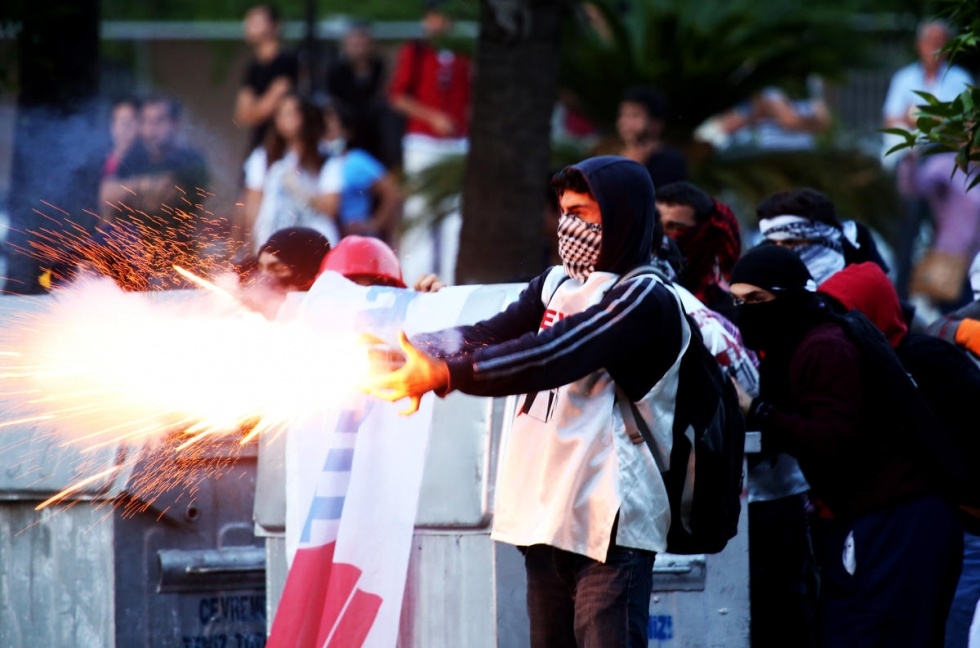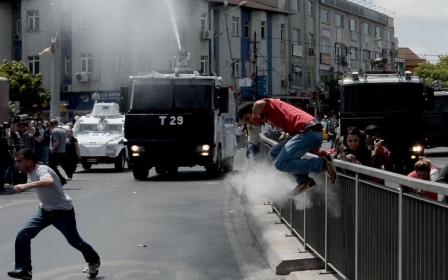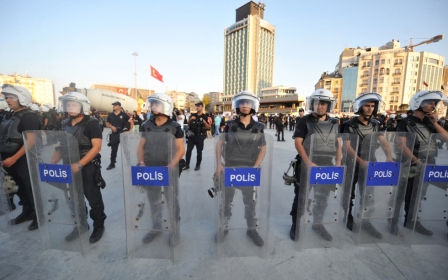Turkey marks first anniversary of Gezi Park protests

Thousands of Turkish police mobilised Saturday in central Istanbul ahead of demonstrations to mark the first anniversary of last year's Gezi Park protests that mushroomed into a revolt against Prime Minister Recep Tayyip Erdogan's rule.
Erdogan's government deployed thousands of riot police and police in civilian clothes to enforce a ban on protests at Taksim Square, the epicentre of last year's demonstrations, an AFP reporter said.
Erdogan on Friday urged young Turks to ignore the call to stage a protest to mark the anniversary of a movement that began last year as a neighbourhood bid to save Gezi Park from real estate developers.
Following a deadly police crackdown, the protests swelled into an outpouring of anger against the perceived authoritarian tendencies of the government.
"One year later, people, including so-called artists, are calling for demonstrations, but you, Turkey's youth, you will not respond to the call," Erdogan told a crowd of a thousand young people in Istanbul.
New MEE newsletter: Jerusalem Dispatch
Sign up to get the latest insights and analysis on Israel-Palestine, alongside Turkey Unpacked and other MEE newsletters
"These terrorist organisations manipulated our morally and financially weak youth to attack our unity and put our economy under threat," Erdogan said.
Turkish media reported that around 25,000 police officers as well as dozens of water cannon trucks and armoured vehicles would be deployed to Istanbul on Saturday to prevent demonstrators from reaching the square.
The opposition leader urged the authorities to let people peacefully protest.
"Let the young people protest as they want. They are peaceful, they can't harm anyone. What will you achieve with all these bans?" said Kemal Kilicdaroglu, leader of the Republican People's Party (CHP).
Tensions grew when a 64-year-old woman who fell into a coma after inhaling tear gas during last year's protests died this week at an Istanbul hospital.
A total of eight people died and thousands were wounded as a result of the crackdown on the protests, which turned into the largest challenge to Erdogan since his party came to power in 2002.
Timeline of events
2013
31 May: Violence erupts at a rally in Istanbul's Gezi Park, near Taksim Square, when riot police fire tear gas to clear hundreds of demonstrators, unleashing three weeks of unprecedented protests.
Across the country 3.5 million demonstrators demand Erdogan's resignation. The prime minister has been in power since March 2003.
The protests are violently repressed, leaving eight dead, more than 8,000 injured and 5,000 arrested, drawing an international uproar.
13 November: A feud emerges between Erdogan and exiled influential Muslim cleric Fethullah Gulen after the government floats plans to close down a network of private schools run by Gulen's Hizmet.
17 December: Police detain 80 people in a sweeping probe into alleged corruption implicating some of Erdogan's closest allies.
Erdogan describes the probe as an "ugly operation" against the government and carries out a purge of the police and judiciary. Thousands of demonstrators demand his resignation and the Turkish pound falls.
2014
2 January: Turkey's military demands a retrial for army officers convicted of plotting to topple the government, claiming the evidence was fabricated by the pro-Gulen judiciary.
February-April: Controversial laws are voted in by the government tightening controls over web use and the judiciary, while expanding the power of Turkey's domestic intelligence services.
24 February: Leaked recordings posted on YouTube of Erdogan and his son allegedly discussing how to hide large sums of money lead to further calls for his government to resign.
11 March: The death of a teenage boy wounded in the mass anti-government demonstrations in June 2013 leads to mass anti-Erdogan protests in which two are killed.
20 March: Turkey blocks access to Twitter and then YouTube. Two weeks later the top constitutional court strikes down the ban on Twitter.
30 March: Erdogan claims victory for the AKP in key local elections and warns his foes that they will "pay the price" for plotting his downfall.
29 April: Erdogan says Turkey will launch proceedings to seek the extradition from the United States of Gulen.
13 May: An unprecedented mine disaster that claims 301 lives sparks new anti-government protests, which are violently repressed leaving two dead on 22-23 May in Istanbul.
Middle East Eye delivers independent and unrivalled coverage and analysis of the Middle East, North Africa and beyond. To learn more about republishing this content and the associated fees, please fill out this form. More about MEE can be found here.




